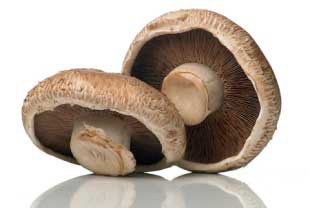Can Mushrooms Really Help Prevent Breast Cancer?
Although the Chinese have been eating mushrooms for health for millennia, the western world really took notice in 2009 when a large Australian study reported that women who ate an average of one button mushroom a day had less than half the risk of breast cancer when compared to women who didn’t eat mushrooms (Zhang 2009). The resulting publicity really got people thinking about mushrooms beyond their natural abundance of B vitamins and minerals like selenium.
Around the same time of the Australian study, there were two other studies revealing that women eating mushrooms regularly had half the risk of breast cancer compared to the non-eaters. (Hong 2008; Shin 2010).
With 3500 Australian women dying of breast cancer each year (it is the leading cause of death of women aged 35-65 years); you can see why researchers were concentrating on whether mushrooms had the capability to influence breast cancer cells.
Mushrooms Stop Breast Cancer Cells
The hormone estrogen encourages breast cancer cell growth. Extracts from mushrooms suppress aromatase activity and estrogen production. This may be part of the reason that research shows mushroom extracts stop the proliferation of breast cancer cells. Professor Chen, a leading cancer researcher, stated that just 100 g of white button mushrooms were offering the beneficial effect seen with the extracts. That’s just three button mushrooms.
Why could the mushroom be having an anti-cancer effect not seen with vegetables? We must understand that it is neither a plant nor an animal. The mushroom lives in its own biological kingdom, bringing nutrition and health benefits that we might not see with vegetables.
Mushrooms Have Beta-Glucans
The compounds in mushrooms most likely to have an anti-cancer function are special carbohydrates called beta-glucans. These seem to activate cancer-killing immune cells in the blood. It is also possible that vitamin D2 is protective against breast cancer. Mushrooms are the only natural non-animal source of vitamin D if they have been exposed to sunlight or UV light.
Mushrooms boost immunity by increasing immune cells such as the Natural Killer Cell numbers, thereby potentially reducing cancer risk (Wu 2007). The University of Western Sydney also found that mushrooms have two protein-carbohydrate complexes that kill cancer cells and boost immune function in humans (Jeong 2012).
CSIRO Reviews Mushroom Benefits
Those researching mushrooms had long suspected that it had anti-cancer powers. Recently, the CSIRO published a review of all the research on mushrooms and health, and specifically looked at their influence on breast cancer (Roupas 2012). They stated: “The most promising data appear to be those indicating an inverse relationship between mushroom consumption and breast cancer risk … the effects need to be confirmed via intervention trials involving mushroom consumption.”
The Future is Very Promising
That means it is only when human trials, which have now started, mirror the exciting laboratory results will the scientists start punching the air and doing a victory dance.
In the meantime, enjoy mushrooms because they are nutrient-rich, low kilojoule, virtually fat-free and have that wonderful savory flavor. Down the track, science might also prove that you have greatly reduced your risk of breast cancer.
References
- Hong, S. A., Kim, K., Nam, S.-J., Kong, G., & Kim, M. K. (2008). A case-control study on the dietary intake of mushrooms and breast cancer risk among Korean women. International journal of cancer. Journal international du cancer, 122(4), 919–23. doi:10.1002/ijc.23134
- Jeong, S. C., Koyyalamudi, S. R., Jeong, Y. T., Song, C. H., & Pang, G. (2012). Macrophage immunomodulating and antitumor activities of polysaccharides isolated from Agaricus bisporus white button mushrooms. Journal of medicinal food, 15(1), 58–65. doi:10.1089/jmf.2011.1704
- Shin, A., Kim, J., Lim, S.-Y., Kim, G., Sung, M.-K., Lee, E.-S., & Ro, J. (2010). Dietary mushroom intake and the risk of breast cancer based on hormone receptor status. Nutrition and cancer, 62(4), 476–83. doi:10.1080/01635580903441212
- Wu, D., Pae, M., Ren, Z., Guo, Z., Smith, D., & Meydani, S. N. (2007). Dietary supplementation with white button mushroom enhances natural killer cell activity in C57BL/6 mice. The Journal of nutrition, 137(6), 1472–7. Retrieved from http://www.ncbi.nlm.nih.gov/pubmed/17513409
- Zhang, M., Huang, J., Xie, X., & Holman, C. D. J. (2009). Dietary intakes of mushrooms and green tea combine to reduce the risk of breast cancer in Chinese women. International journal of cancer. Journal international du cancer, 124(6), 1404–8. doi:10.1002/ijc.24047
Last reviewed 26/Feb/2014
